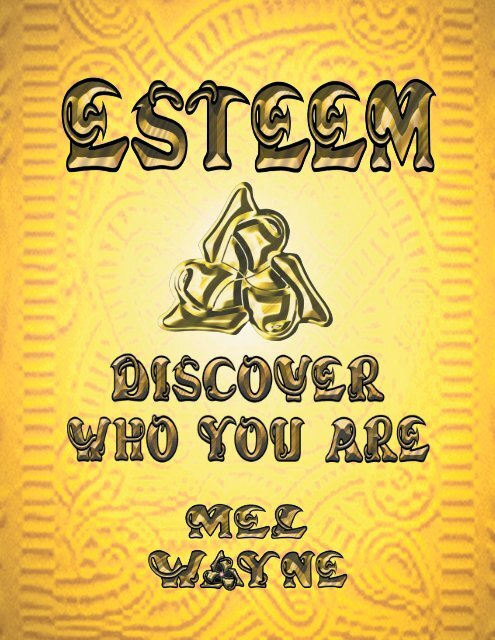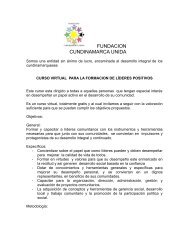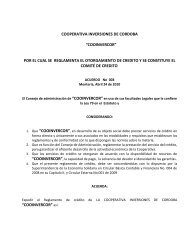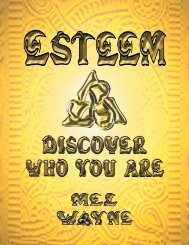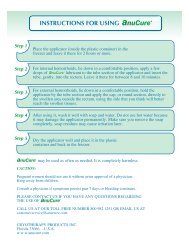Esteem: Discover Who You Are
Esteem: Discover Who You Are
Esteem: Discover Who You Are
You also want an ePaper? Increase the reach of your titles
YUMPU automatically turns print PDFs into web optimized ePapers that Google loves.
“Thoughts are the most<br />
powerful force in the universe.”<br />
—Metamorphosis<br />
II
Mel Wayne<br />
III
Wayne, Mel.<br />
Cataloging In Publication Information<br />
<strong>Esteem</strong> : discover who you are / by Mel Wayne.<br />
ISBN - 1 3 : 9 7 8 - 0 - 9 6 4 2 0 2 2 - 7 - 6<br />
I S B N - E b o o k - 1 3 : 9 7 8 - 0 - 9 6 4 2 0 2 2 - 6 - 9<br />
1. Self-<strong>Esteem</strong> 2. Inspiration 3. Self-Help<br />
4. Self-Actualization 5. Leadership I. Title.<br />
Artwork: Maps, Paintings and Illustrations by = Hunter Wainright :<br />
Alan Michael Smith, Dell Barras, Charles Bloomer, and Mel Wayne.<br />
Edited by Pamela, the wise reader.<br />
No part of this book may be reproduced by any mechanical, photographic, or<br />
electronic process, or in the form of a phonographic recording; nor may it be stored<br />
in a retrieval system, transmitted, or otherwise be copied for public or private<br />
use—other than for “fair use” as brief quotations embodied in articles and reviews—<br />
without prior written permission of the publisher.<br />
The author of this book does not dispense medical advice or prescribe the use of<br />
any technique as a form of treatment for physical, emotional, or medical problems<br />
without the advice of a physician, either directly or indirectly. The intent of the<br />
author is only to offer information of a general nature to help you in your quest for<br />
emotional and spiritual well-being. In the event you use any of the information<br />
in this book for yourself, which is your constitutional right, the author and the<br />
publisher assume no responsibility for your actions.<br />
Octilogy TM and Planet Millennium TM are registered Trade Marks.<br />
International Standard Book Number: 13: 9 7 8 - 0 - 9 6 4 2 0 2 2 - 7 - 6<br />
Copyright © 2013 by Freedom Within Foundation. All Rights Reserved.<br />
IV
M el Wayne<br />
Author<br />
With the vision of inspiring you to discover<br />
personal insights into who you truly are, how<br />
to immediately improve your life—<br />
“change your thinking, change your life”—<br />
Mel Wayne presents his inspirational book:<br />
<strong>Esteem</strong>: <strong>Discover</strong> <strong>Who</strong> <strong>You</strong> <strong>Are</strong>.<br />
The cure for the Dark Plague, Curse of the Universe,<br />
is presented in a new and enlightening way.<br />
Inspirational books by Mel Wayne<br />
• The Great Way<br />
• The Great Way - Deluxe Color Edition<br />
• M o r p h : S a g e o f t h e A g e s<br />
V
www.TheGreatWayBook.com<br />
www.TheGreatWayBlog.com<br />
www.FreedomWihinFoundation.org<br />
“There is no time but this time;<br />
there is no moment but this moment .”<br />
—Metamorphosis<br />
Visit Mel Wayne at<br />
<strong>You</strong>Tube Facebook Twitter<br />
<br />
VI<br />
I
Table of Contents<br />
Change is Possible<br />
I. Identify Low Self-<strong>Esteem</strong><br />
II. Recognize High Self-<strong>Esteem</strong><br />
III. <strong>Discover</strong> Others—<strong>Discover</strong> Self<br />
IV. Silence—Learn to Listen<br />
V. Never Say “I” Until Asked<br />
VI. Eliminate Put Downs<br />
VII. Forgive and Forget<br />
VIII. Live Life as a Leader<br />
Extractor Compendium<br />
Page 9<br />
Page 13<br />
Page 32<br />
Page 36<br />
Page 40<br />
Page 46<br />
Page 52<br />
Page 58<br />
Page 66<br />
Page 82<br />
VII
i v e i f e as a e a d e r<br />
“The universe has many voices; just listen.”<br />
—Metamorphosis<br />
VIII
Change Is Possible<br />
ll things happen in perfect order.<br />
The arrival of this book in your<br />
life is no exception. <strong>You</strong> are<br />
about to experience a lifechanging<br />
event, an epiphany of the highest<br />
order. <strong>You</strong> will soon discover that you do have<br />
control of your life, that change is possible.<br />
<strong>You</strong>r quest for inner change begins with an<br />
intriguing question. The question is, “What<br />
devastating Emotional Virus has infected<br />
humans throughout recorded history—since<br />
the dawn of social awareness?”<br />
The awakening answer is: low self-esteem.<br />
<strong>You</strong> are about to discover that many people<br />
you know and love suffer from the emotionally<br />
crippling disease (dis-ease) known as low selfesteem.<br />
Often referred<br />
to as “egotistical<br />
behavior”, the low selfesteem<br />
Emotional Virus<br />
has been unintentionally passed from<br />
parents to children, generation to generation,<br />
since the beginning of civilization. All humans<br />
suffer from some form of the Emotional Virus.<br />
If you doubt the above statement, think<br />
for a moment. Whenever low self-esteem is<br />
mentioned, the typical response is, “I don’t<br />
have low self-esteem!” The reason people deny<br />
it is because they have it and do not know it.<br />
Low self-esteem sufferers are not aware of<br />
their condition, or they live in denial.<br />
Whenever high self-esteem is mentioned,<br />
people exclaim, without hesitation, “Oh, I<br />
have high self-esteem!” As you will soon<br />
discover during your search for happiness and<br />
contentment, the people who possess a healthy<br />
self-image never make such statements.<br />
“Keep in mind that each moment is special,<br />
that each experience has its own treasure.”<br />
—Metamorphosis<br />
<br />
Now that you have begun your quest<br />
to discover who you truly are, there is an<br />
excellent chance you are experiencing anxiety,<br />
denial, confusion, or anger. After all, you just<br />
read that your friends, relatives, coworkers,<br />
and life partner—everyone—suffers from<br />
some form of the Emotional Virus. Right now,<br />
you might be thinking, “Do I, myself, have<br />
low self-esteem?” or possibly, “I know I don’t<br />
have low self-esteem; this book was written<br />
for someone else.” Perhaps you feel calm and<br />
reassured, realizing you have finally found the<br />
answer to why you are so unhappy.<br />
Whatever your reaction, one thing is<br />
certain: your desire to become a better<br />
person—to change—has brought you to this<br />
unique moment in<br />
time, to this page in<br />
this book—<strong>Esteem</strong>.<br />
Relax, breathe<br />
deeply, and begin the revelation<br />
of a lifetime—the self-discovery that you<br />
are going to change, that you are going to<br />
grow emotionally, that you are going to find<br />
contentment. For indeed, the bliss of eternity<br />
may be found in your own contentment.<br />
To begin your quest for change, you must<br />
determine how you interact with people; that<br />
is, how you behave toward others. Based on<br />
your own self-image, there are two ways you<br />
deal with the people around you:<br />
• The low self-esteem way.<br />
• The high self-esteem way.<br />
The low self-esteem way, also known as<br />
“taking the low road”, is based on intimidation,<br />
manipulation, deception, extortion, arrogance,<br />
domination, selfishness, and greed.
One or more persons “win” while all<br />
others are “losers”. <strong>You</strong> will soon discover<br />
why “taking the low road” is the behavior<br />
most people choose.<br />
The high self-esteem way, “the high road”,<br />
is based on the even exchange of what all<br />
persons, or parties, desire. The result is fair<br />
exchange, give and take, a workable solution,<br />
a consensus. Everyone feels satisfied with<br />
the results or outcome. It is a win-win-win<br />
situation.<br />
Dealing with people<br />
by always taking “the high<br />
road”—living the highest<br />
truth—allows you to feel good about yourself.<br />
To like your Self is the foundation for your<br />
happiness. <strong>You</strong> must like your Self in order<br />
to know who you truly are. Once you know<br />
your Self, you acquire the most desirable trait<br />
anyone can possess—high self-esteem—you<br />
live in a state of contentment. Bliss.<br />
A LIFE-CHANGING CONCEPT<br />
Emotional illness, often described as<br />
dysfunctional and egocentric behavior, is the<br />
result of suffering from low self-esteem, not<br />
the reverse. Stating, “I have low self-esteem<br />
because I am depressed” is incorrect. The<br />
correct statement is, “I am depressed because<br />
I have low self-esteem!” Therefore, by<br />
eliminating low self-esteem, you eliminate<br />
depression and all your other bad habits,<br />
addictions, and egotistical behaviors.<br />
“Listen to the voice within you.”<br />
—Metamorphosis<br />
The elimination of<br />
low self-image will cure<br />
all personality disorders,<br />
including anger, impatience,<br />
violence, hatred, revenge, anxiety, loneliness,<br />
envy, jealousy, greed, racism, eating disorders,<br />
alcohol and drug abuse, dishonesty, guilt, and<br />
depression—just to name a few!<br />
When humans acquire a higher self-image,<br />
violence and war will end. Hatred and jealousy<br />
will cease to exist. Societies will function in<br />
a state of peace and cooperation. A collective<br />
10<br />
consciousness of positive thoughts—high selfesteem—provides<br />
the foundation for a society<br />
of loving, compassionate citizens.<br />
DO I HAVE AN EMOTIONAL VIRUS?<br />
How will you know if you suffer from low<br />
self-esteem—if you have been infected with<br />
the Emotional Virus—Dark Plague?<br />
<strong>You</strong> will know by identifying what low<br />
self-esteem looks like and acts like. <strong>You</strong><br />
must recognize the disease<br />
symptoms. By identifying<br />
low self-esteem— egotistical<br />
behavior—you will know if<br />
you are infected with the Emotional Virus, and<br />
if the people around you are infected.<br />
To acquire freedom within, you must<br />
be able to identify all the low self-esteem<br />
behaviors and eliminate them, one by one,<br />
from your life. <strong>You</strong> must change your thinking.<br />
Change your thinking means eliminate<br />
negative thoughts and replace them with<br />
positive thoughts—affirmations. The reward is<br />
inner peace. Freedom within.<br />
EPIPHANY<br />
People describe an epiphany as “a bright<br />
light turning on inside their heads”. Often<br />
described as the “ahha” moment, you will<br />
know it when it happens.<br />
<strong>You</strong>r transformation, your inner change,<br />
begins with an epiphany. The epiphany<br />
unlocks your mind to the possibility of change.<br />
Without an<br />
“In the middle of difficulty, lies opportunity.” epiphany, change<br />
—Metamorphosis<br />
in your life will<br />
never happen.<br />
A life-changing event is about to happen to<br />
you, an epiphany of the highest magnitude.<br />
As you boldly begin your quest for<br />
personal freedom—freedom within—your<br />
willingness to change rewards you with life’s<br />
greatest treasures. <strong>You</strong> are about to discover<br />
the highest truth—who you truly are—that<br />
change is possible.
Eight Ways to Change<br />
I. Identify Low Self-<strong>Esteem</strong><br />
II. Recognize High Self-<strong>Esteem</strong><br />
III. <strong>Discover</strong> Others—<strong>Discover</strong> Self<br />
IV. Silence—Learn To Listen<br />
V. Never Say “I” Until Asked<br />
VI. Eliminate Put Downs<br />
VII. Forgive and Forget<br />
VIII. Live Life as a Leader<br />
11
Emotional Virus<br />
12
I<br />
Identify Low Self-<strong>Esteem</strong><br />
he identification of the Emotional<br />
Virus—low self-esteem and egotistical<br />
behavior, is the first and most<br />
revealing change in your quest for<br />
a higher self-image. It is easy to identify low<br />
self-esteem characteristics by describing low<br />
self-esteem personality traits.<br />
Prepare yourself for an emotional<br />
revelation—an awakening—an epiphany.<br />
There is an excellent chance you will discover<br />
some of your own character traits in the<br />
upcoming descriptions.<br />
<strong>You</strong> will either feel enlightened and<br />
experience a change of thought, or you will<br />
experience feelings of confusion and denial,<br />
becoming emotionally upset.<br />
<strong>You</strong> are about to discover that nothing, no<br />
thing, is more powerful than the truth—the<br />
highest truth—being honest with yourself.<br />
Symptoms of the Emotional Virus<br />
Low Self-<strong>Esteem</strong><br />
The Emotional Virus—low self-esteem—<br />
has reached epidemic proportions. The first<br />
question you might ask is, “How do I know<br />
this Dark Plague—Curse of the Universe,<br />
really exists?” The way to uncover the truth is<br />
to ask yourself simple questions about human<br />
behavior, about common personality traits.<br />
Begin with the question, “Do I, or anyone<br />
I know, act or behave angry, impatient,<br />
hotheaded, sarcastic, jealous, violent, cruel,<br />
hateful, insensitive, vain, greedy, unethical,<br />
immoral, rude, phony, paranoid, dishonest,<br />
co-dependent, obnoxious, indecent, sad, lazy,<br />
oversensitive, irresponsible, rebellious, moody,<br />
depressed, suicidal, revengeful, unforgiving,<br />
13<br />
selfish, materialistic, or envious?”<br />
If you answered “No” to the above<br />
questions, ask yourself, “Do I, or anyone<br />
I know, ever make fun of others, laugh at<br />
others’ mistakes, interrupt others, talk only<br />
about themselves, argue, constantly complain,<br />
scream at a spouse, yell at a child, make<br />
obscene gestures, intimidate others, tease<br />
others, dwell on the past, procrastinate, sulk,<br />
or suffer from fear of failure?”<br />
If you are still answering “No”, how<br />
about, “Is anyone I know a liar, gossip, poor<br />
listener, braggart, loudmouth, talkaholic,<br />
blabbermouth, flirt, cheater, thief, racist,<br />
supremacist, workaholic, spendthrift,<br />
perfectionist, gambler, drug user, alcoholic,<br />
food abuser, sore loser, sociopath, dare devil,<br />
party animal, lazy, or reclusive loner?”<br />
If you are still answering “No” to the<br />
questions, it is time to read a newspaper, a<br />
blog, the Internet, a magazine, or watch the<br />
nightly news, and you will easily identify<br />
the following low self-esteem personalities:<br />
dictators, drug lords, terrorists, carjackers,<br />
serial killers, rapists, arsonists, rioters,<br />
shoplifters, con artists, slum lords, and<br />
corrupt politicians—to name a few.<br />
After answering “No” to the questions,<br />
people reluctantly admit, “Well, maybe I do<br />
get a little impatient and yell at the kids...so<br />
what!” or “Maybe I’m guilty of taking home<br />
a pencil or paper clips from the office...big<br />
deal, it’s only small stuff!” or “When I scream<br />
at other drivers on the freeway, I feel better...<br />
anyway, they usually deserve it.”<br />
<strong>You</strong> hear statements such as, “I am doing<br />
what my parents taught me and look how
good I turned out!” or “So what if I get angry,<br />
or jealous, or depressed; it’s normal to feel<br />
that way!”<br />
The responses go on—and on—and on.<br />
Many people conclude their comments by<br />
declaring, “Okay, I admit I have one or two<br />
personality traits mentioned on the list, but<br />
that doesn’t mean I have low self-esteem.”<br />
Another typical response is, “I know low selfesteem<br />
people are bad and I’m good; therefore,<br />
I can’t have low self-esteem.”<br />
<strong>Are</strong> these responses right or wrong?<br />
As mentioned earlier, many people will<br />
not admit they suffer<br />
from low self-esteem.<br />
Some individuals are<br />
somewhat aware of<br />
their disorders, living in<br />
a self-denial mode, but<br />
the majority of people<br />
are simply unaware or<br />
uneducated about what low<br />
self-esteem really is—what the<br />
Emotional Virus looks like.<br />
So back to the question.<br />
When an individual admits<br />
to yelling at children and<br />
then adds, “But that<br />
doesn’t mean I suffer<br />
from low self-esteem,” is the<br />
individual right or wrong? Is the<br />
statement correct or incorrect?<br />
To answer now would be untimely and<br />
inappropriate, for the path to personal<br />
freedom must be traveled cautiously.<br />
First, you must find out exactly what low<br />
self-esteem acts like and behaves like so you<br />
may begin your self-esteem journey—your<br />
search for a higher self-image—to discover<br />
who you are. It is time for you to meet those<br />
familiar low self-esteem characters you<br />
encounter every day of your life—at home, at<br />
work, at play, and in personal relationships.<br />
<strong>You</strong> must learn how they behave, before<br />
you learn why they behave as they do.<br />
14<br />
The low self-esteem personalities are:<br />
The Intimidator<br />
The Impatient Hothead<br />
The Power Fanatic<br />
The Sarcastic Assassin<br />
The Depressant<br />
The Oversensitive Soul<br />
The Shy Scaredy Cat<br />
The Hypocrite Liar<br />
The Compulsive Addict<br />
The Co-Dependent<br />
The Unfriendly Phony<br />
The Procrastinator<br />
The Miserable Miser<br />
The Show Off Braggart<br />
The Unethical Trickster<br />
The Stressaholic<br />
The Gossip Monger<br />
The Talkaholic<br />
The Spoiled Brat<br />
The Conceited Looker<br />
The Pessimist<br />
The Prankster<br />
The Arguing Sorehead<br />
The Unforgiving Avenger<br />
The Unfaithful Lover<br />
The Rebel Outlaw<br />
The Moody Maniac<br />
The Angry Bigot
The Intimidator<br />
These Controlling Characters are the<br />
domineering physical Bullies who get in your<br />
face and resort to physical violence to get<br />
their way. Preying on smaller and weaker foe,<br />
these Bullies specialize in the physical threat,<br />
obscene gesture, or scare tactic before their<br />
opponent “gets the upper hand”.<br />
How do Intimidators function in society?<br />
At home, Pushy Individuals are overbearing<br />
and rule with an iron fist, unwilling<br />
to bend or compromise.<br />
During school, Bullies choose off and<br />
intimidate everyone in the schoolyard.<br />
At work, Ruffians order coworkers around.<br />
If they are the boss, these Dominators threaten<br />
employees with demotions and terminations<br />
as part of the daily work routine.<br />
At play, Brutes wipe out their opponents,<br />
determined to beat their adversary at any cost.<br />
At personal relationships, Intimidators rule<br />
the nest by harassing their timid partner into<br />
fear and emotional submission with violent<br />
threats followed by degrading put downs.<br />
The Impatient Hothead<br />
These Volatile Characters are angry and<br />
upset about everything, finding any excuse<br />
to yell and scream at family members, friends,<br />
relatives, coworkers and any unfortunate<br />
strangers who cross their path. These angry<br />
Loudmouths are incredibly short-tempered and<br />
easily provoked. They are extremely impatient,<br />
unwilling to wait for anything. They specialize<br />
in appearing calm but may explode into an<br />
uncontrollable rage without warning.<br />
How do Impatient Hotheads function in society?<br />
At home, Yellers are unpredictable and<br />
shout about the least little incident.<br />
At work, Screamers recklessly raise their<br />
voices at coworkers, overreacting to mistakes.<br />
At play, Time Bombs yell insults and<br />
obscenities, especially when they are losing or<br />
not getting their way.<br />
At personal relationships, Impatient<br />
Hotheads cause their ill-at-ease partner to<br />
live in constant fear of being harassed, yelled<br />
at and screamed at—a fearful, one-sided<br />
relationship of emotional unrest.<br />
“What does low self-esteem<br />
look like?”<br />
—Metamorphosis<br />
“Low self-esteem<br />
is not pretty!”<br />
—Metamorphosis<br />
See The Intimidator<br />
• Extractor Compendium<br />
Page 86<br />
See The Impatient Hothead<br />
• Extractor Compendium<br />
Page 86<br />
15
The Power Fanatic<br />
These tyrannical Slave Drivers are obsessed<br />
with total power and control—craving money,<br />
cars and real estate at the expense of others.<br />
Dictators believe the oppression of people<br />
equals success. Overachievers, unable to enjoy<br />
accomplishments, set unrealistically high<br />
standards, resulting in their persistent need to<br />
prove themselves. Envious of others, the more<br />
they get—the more they want.<br />
How do Power Fanatics function in society?<br />
At home, Perfectionists demand having<br />
things done their way, and only their way.<br />
At work, Controllers bark orders and call<br />
the shots, methodically plotting the overthrow<br />
of others to gain position and wealth—power.<br />
At play, Tyrants are too serious, becoming<br />
emotionally devastated when losing.<br />
At personal relationships, Power Fanatics<br />
relentlessly pursue their “prey” and once<br />
captured, their tormented partner is treated<br />
(mistreated) as a worldly possession—object.<br />
The Sarcastic Assassin<br />
These Put Down Artists hurt your feelings.<br />
Bad Mouthers avoid physical confrontations,<br />
making you feel small and embarrassing you<br />
before you become a threat. Disguising cruel<br />
comments as friendly jokes and sarcastic<br />
statements, they complete each personal<br />
assault—put down—with, “Just Kidding!”<br />
How do Sarcastic Assassins function in<br />
society?<br />
At home, Ridiculers make one put down<br />
after the other. No one escapes their wrath.<br />
At work, Put Down Specialists are<br />
verbally brutal, making others feel small or<br />
embarrassed, then, laughing it off as a joke.<br />
At play, Sultans of Smack taunt and jeer<br />
opponents into total submission.<br />
At personal relationships, Sarcastic<br />
Assassins are so busy making fun of everyone<br />
else, they rarely notice their neglected partner.<br />
These Taunters are living proof that the<br />
tongue is mightier than the sword.<br />
“Frightful are they who<br />
suffer from low self-esteem.”<br />
—Metamorphosis<br />
See The Power Fanatic<br />
• Extractor Compendium<br />
Page 87<br />
“Low self-worth disfigures the<br />
body, mind, and spirit.”<br />
—Metamorphosis<br />
See The Sarcastic Assassin<br />
• Extractor Compendium<br />
Page 87<br />
16
The Depressant<br />
These Downcast Characters look at life as<br />
hopeless. They look down-hearted, long-faced<br />
and miserable. Always sad, often suicidal,<br />
Lethargics barely make it through the day.<br />
When asked why they are depressed, these<br />
emotionally Lost Souls search for logical<br />
answers, mumbling, “I’m not sure,” as they<br />
unhappily sigh.<br />
How do Depressants function in society?<br />
At home, sullen Couch Potatoes are often<br />
asleep, or staring endlessly at the television, or<br />
mindlessly surfing the internet.<br />
At work, Poker Faces appear bored and<br />
listless, getting little accomplished.<br />
At play, Losers give up easily and when<br />
losing a game exclaim, “See, I always lose!”<br />
At personal relationships, Depressants are<br />
filled with self-pity and endless complaints.<br />
Abuse of food, alcohol and drugs is often a<br />
source of psychological comfort. Functional<br />
relationships are impossible as the Melancholic’s<br />
partner suffers from emotional neglect.<br />
The Oversensitive Soul<br />
These Overcautious Characters take things<br />
very personally. Each comment is considered<br />
a put down and every statement has a double<br />
meaning or hidden message. When you<br />
compliment them by saying their hair looks<br />
great, they are thinking “I know I must look<br />
terrible, they’re really making fun of me!”<br />
These Paranoids, always on the defensive, are<br />
unwilling to accept any compliments.<br />
How do Oversensitive Souls function in society?<br />
At home, Pathetics act temperamental,<br />
hypersensitive and irreversibly irritable.<br />
At work, Thin Skins overreact to their<br />
coworkers’ comments or suggestions.<br />
At play, Overreactors are quarrelsome,<br />
easily hurt and deeply sad when losing.<br />
At personal relationships, Oversensitive<br />
Souls never open up or show their true<br />
feelings. They are shamefully suspicious<br />
and untrustworthy of their partner. Worst<br />
yet, Head Cases overanalyze every statement,<br />
making conversation virtually impossible.<br />
“What does low self-esteem<br />
look like?”<br />
—Metamorphosis<br />
“<strong>You</strong>r self-esteem<br />
determines how you look.”<br />
—Metamorphosis<br />
See The Depressant<br />
• Extractor Compendium<br />
Page 88<br />
See The Oversensitive Soul<br />
• Extractor Compendium<br />
Page 88<br />
17
The Shy Scaredy Cat<br />
These Easily Embarrassed Characters are<br />
quiet, shy, and think by staying out of every<br />
person’s way, they will be popular. Cowards<br />
avoid confrontations, allowing people to step<br />
all over them. Having every phobia imaginable,<br />
Wussies are afraid to try new things or meet<br />
new people. Fear is their greatest enemy. Their<br />
favorite saying is “I can’t.” “I don’t want to.”<br />
How do Shy Scaredy Cats function in<br />
society?<br />
At home, which they seldom venture from,<br />
Reclusives are withdrawn, allowing others to<br />
step all over them—do whatever they please.<br />
At work, brown-nosing Yes People are<br />
intimidated by others, will not make decisions<br />
and are victims of cruel office jokes, ridicule<br />
and harassment.<br />
At play, Bashful Loners are unsociable and<br />
reluctant to get involved—join in the fun.<br />
At personal relationships, Shy Scaredy Cats<br />
are timid, coy and lack confidence, expecting<br />
their partner to carry the emotional load.<br />
The Hypocrite Liar<br />
These Deceiving Characters are two-faced<br />
liars, fibbers and perjurers. Sham Artists have<br />
been untrue to themselves and others since<br />
childhood, graduating from little white lies to<br />
huge whopping lies. By adulthood, Deceivers<br />
lie so much they forget where the lie ends and<br />
the truth begins. They believe their own lies.<br />
How do Hypocrite Liars function in<br />
society?<br />
At home, Liars fib from morning to night,<br />
and when caught, firmly deny each lie.<br />
At work, Fibsters make coworkers uneasy<br />
and employees mistrustful, often destroying<br />
the integrity of the work place.<br />
At play, Poor Sports lie through their teeth<br />
just to win. Cheating is part of the game.<br />
At personal relationships, Hypocrite Liars<br />
create such an unstable family atmosphere<br />
that their partner lives with frequent<br />
feelings of deceit and betrayal, all because<br />
smooth-tongued, lip-serving Charlatans are<br />
untrustworthy.<br />
“When you act ugly,<br />
ugly you become.”<br />
—Metamorphosis<br />
See The Moody Maniac<br />
• Extractor Compendium<br />
Page 99<br />
“What does low self-esteem<br />
look like?”<br />
—Metamorphosis<br />
See The Angry Bigot<br />
• Extractor Compendium<br />
Page 99<br />
18
The Low Self-<strong>Esteem</strong>ers<br />
These Dysfunctional Characters suffer from<br />
multiple forms (two or more) of the low selfesteem<br />
diseases. In other words, a person may<br />
be an Intimidating-Impatient-Complaining-<br />
Unforgiving-Moody Stressaholic, or an<br />
Oversensitive-Unfriendly-Unethical-Sarcastic<br />
Talkaholic, or an Arguing-Gossiping-Conceited-<br />
Lying Unfaithful Lover.<br />
The more low self-esteem behavioral traits<br />
a person has, the lower their self-image.<br />
How low is low? The ultimate example of<br />
a low self-esteemer is Ex the Master Extractor.<br />
The Invisible Villain suffers from all twentyeight<br />
forms of low self-esteem. Ex is low selfesteem<br />
in its lowest of lowest forms.<br />
This concludes the review of<br />
low self-esteem personalities.<br />
What about these characters? Why do<br />
they act so terrible? How did they learn such<br />
dysfunctional behavior? Do they realize how<br />
bad they behave? Will they ever change?<br />
After evaluating the list of low self-esteem<br />
personalities, a common response is, “Their<br />
personality traits are identical to many of the<br />
people I know or meet!”<br />
In reality, the vivid descriptions of the low<br />
self-esteem personalities are a rude awakening.<br />
The truth is: most people you come in contact<br />
with, everyone from perfect strangers to your<br />
closest loved ones, suffer from one or more<br />
forms of low self-esteem.<br />
Most people you know suffer from<br />
multiple forms of the Emotional Virus—Dark<br />
Plague—low self-esteem.<br />
The one person you fail to recognize as being<br />
infected with low self-image, the one person you<br />
most often overlook is, of course, yourself.<br />
As you ponder the behavior of low selfesteem<br />
characters, two questions must be<br />
answered. First, “How do low self-esteem<br />
people acquire low self-esteem in the first<br />
place?” Second, “Why do low self-esteem<br />
people continue to practice, on a day to day<br />
basis, such emotionally crippling behavior?”<br />
The answer is shockingly simple.<br />
See The Low Self-<strong>Esteem</strong>er—Ex<br />
• Extractor Compendium<br />
Pages 100 and 101<br />
19<br />
LEGACY OF LOW SELF-ESTEEM<br />
The Emotional Virus—low self-esteem—has<br />
been unintentionally passed from generation to<br />
generation since the beginning of recorded history.<br />
The Emotional Virus continues to<br />
spread, seemingly undetected, as follows:<br />
• From parents and stepparents to the child.<br />
• From grandparents to the child.<br />
• From brothers/sisters/relatives to the child.<br />
• From teachers/role models to the child.<br />
• From the peer group to the child.<br />
• From the media—television, movies, books,<br />
internet, radio, video games, and music.
IT IS NOT THEIR FAULT<br />
It is important to remember that low selfesteem<br />
is unintentionally passed to the next<br />
generation. No parent or teacher plots and<br />
plans to give low self-esteem to their children<br />
or students. They are unaware they are doing<br />
it; it is not their fault.<br />
Throughout their entire adulthood,<br />
dysfunctional low self-esteem sufferers<br />
unknowingly teach bad behavior to their own<br />
children, spouse, friends, business associates,<br />
and social contacts without ever realizing it.<br />
In effect, by accident. Most people believe they<br />
are doing the right thing; after all, this is how<br />
they were raised by their parents and teachers.<br />
Since people with low self-esteem are<br />
raised in a dysfunctional family atmosphere,<br />
the chances of them passing low self-esteem<br />
behavioral traits on to their children is<br />
guaranteed.<br />
Logically, you can trace your own<br />
genealogy of low self-esteem by simply<br />
reviewing your own family tree. “I got low<br />
self-esteem from my parents...who got it from<br />
their parents...who got it from their parents...<br />
and so on...and so on.”<br />
Each generation of parents<br />
faithfully passes on what<br />
they consider to be normal<br />
behavior to the next generation. This<br />
self-destructive cycle has been reoccurring for<br />
centuries. No wonder Planet Earth is overrun<br />
with social, political and economic turmoil.<br />
IN DENIAL<br />
Fact: low self-image promotes self-denial.<br />
Self-denial, or being “in denial”, prevents you<br />
from making correct decisions and stands in<br />
the way of clear thinking. When you are in<br />
denial, you create a fake reality, destroying<br />
any chance you have to improve emotionally.<br />
Denial takes away your desire to change,<br />
robbing you of the highest truth. When<br />
you are in denial you experience emotional<br />
instability, and you refuse to admit it.<br />
“There is no way to happiness;<br />
happiness is the way.”<br />
—Metamorphosis<br />
20<br />
It is easier to tell yourself, “There is no<br />
problem,” than to deal with the issues at hand.<br />
<strong>You</strong> hope the problem will go away by itself—<br />
disappear into thin air. It never does.<br />
Self-denial is learned. <strong>You</strong> are not born<br />
with it. Denial, like all other forms of low<br />
self-esteem, is acquired during childhood by<br />
observing your parents, siblings, relatives, and<br />
teachers—all of them living in denial.<br />
AN EPIPHANY<br />
<strong>You</strong> have now identified low self-esteem<br />
characters, the Extractors, and how they<br />
behave. <strong>You</strong> have experienced an epiphany—<br />
that “ahhha” moment when the “light bulb”<br />
illuminates in your mind and you suddenly<br />
realize the highest truth—a revelation. <strong>You</strong>r<br />
epiphany fills you with high spirit and a<br />
dedication to improve your behavior—the<br />
desire to change.<br />
<strong>You</strong> have now put low self-esteem in<br />
proper perspective by identifying it. By<br />
recognizing the Emotional Virus—Dark<br />
Plague: Curse of the Universe—you have<br />
forced the sinister low self-esteem invaders<br />
from the dark shadows of<br />
human emotion into the bright<br />
sunlight of self-awareness.<br />
<strong>You</strong> are now aware of<br />
low self-esteem behavior and vow to<br />
eliminate it from your life. <strong>You</strong>r senses are<br />
magnified—keenly alert.<br />
<strong>You</strong> now see your friends and family in a<br />
different light. <strong>You</strong> are attentive, but cautious,<br />
as you observe low self-esteem behavior in<br />
action, “played out” before your very eyes.<br />
<strong>You</strong> now realize how low self-esteem behavior<br />
is acquired during childhood.<br />
<strong>You</strong> have found the first great treasure—<br />
love. Self-love.<br />
<strong>You</strong> must now continue your journey, your<br />
search for self—to discover who you are—so<br />
you may eliminate your own low self-esteem.<br />
<strong>You</strong>r second change: Recognize High Self-<br />
<strong>Esteem</strong>, awaits you.
First Universal Truth:<br />
“Like Attracts Like”<br />
First Great Treasure: Love<br />
The Eternal Rose<br />
at the Sea of <strong>Esteem</strong><br />
21


